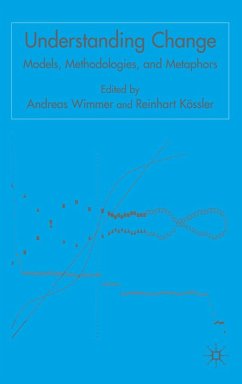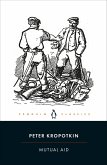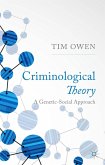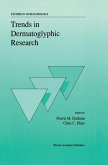Reinhart Kossler / Andreas Wimmer (eds.)Models, Methodologies and Metaphors
Understanding Change
Models, Methodologies and Metaphors
Herausgegeben:Wimmer, A.; Kössler, R.
Schade – dieser Artikel ist leider ausverkauft. Sobald wir wissen, ob und wann der Artikel wieder verfügbar ist, informieren wir Sie an dieser Stelle.
Reinhart Kossler / Andreas Wimmer (eds.)Models, Methodologies and Metaphors
Understanding Change
Models, Methodologies and Metaphors
Herausgegeben:Wimmer, A.; Kössler, R.
- Gebundenes Buch
- Merkliste
- Auf die Merkliste
- Bewerten Bewerten
- Teilen
- Produkt teilen
- Produkterinnerung
- Produkterinnerung
What can economics, the natural and the social sciences learn from each other in better understanding complex forms of change? How far can models, methodologies or metaphors that have been used successfully in one disciplinary field be 'exported' and meaningfully applied to other fields? Distinguished researchers from across the globe assess, in a rare example of successful cross-disciplinary engagement, the explanatory power of chaos theory, new evolutionary theory, path dependency, neo-institutional economics, multiple modernities and historical institutionalism. The book provides an…mehr
Andere Kunden interessierten sich auch für
![Mutual Aid Mutual Aid]() Peter KropotkinMutual Aid8,99 €
Peter KropotkinMutual Aid8,99 €![Criminological Theory Criminological Theory]() T. OwenCriminological Theory39,99 €
T. OwenCriminological Theory39,99 €![Criminological Theory Criminological Theory]() T. OwenCriminological Theory39,99 €
T. OwenCriminological Theory39,99 €![Protection of Human Research Subjects Protection of Human Research Subjects]() D. M. MaloneyProtection of Human Research Subjects81,99 €
D. M. MaloneyProtection of Human Research Subjects81,99 €![Trends in Dermatoglyphic Research Trends in Dermatoglyphic Research]() Trends in Dermatoglyphic Research121,99 €
Trends in Dermatoglyphic Research121,99 €![Endemic Endemic]() Endemic123,99 €
Endemic123,99 €![Bringing Ecologists and Economists Together Bringing Ecologists and Economists Together]() Bringing Ecologists and Economists Together116,99 €
Bringing Ecologists and Economists Together116,99 €-
-
What can economics, the natural and the social sciences learn from each other in better understanding complex forms of change? How far can models, methodologies or metaphors that have been used successfully in one disciplinary field be 'exported' and meaningfully applied to other fields? Distinguished researchers from across the globe assess, in a rare example of successful cross-disciplinary engagement, the explanatory power of chaos theory, new evolutionary theory, path dependency, neo-institutional economics, multiple modernities and historical institutionalism. The book provides an exciting panorama of state of the art thinking and new avenues to combining the power of various traditions of thought.
Produktdetails
- Produktdetails
- Verlag: Palgrave Macmillan / Palgrave Macmillan UK / Springer Palgrave Macmillan
- Artikelnr. des Verlages: 978-1-4039-3941-8
- 2006
- Seitenzahl: 314
- Erscheinungstermin: 5. Dezember 2005
- Englisch
- Abmessung: 216mm x 140mm x 22mm
- Gewicht: 571g
- ISBN-13: 9781403939418
- ISBN-10: 1403939411
- Artikelnr.: 21496368
- Herstellerkennzeichnung
- Libri GmbH
- Europaallee 1
- 36244 Bad Hersfeld
- gpsr@libri.de
- Verlag: Palgrave Macmillan / Palgrave Macmillan UK / Springer Palgrave Macmillan
- Artikelnr. des Verlages: 978-1-4039-3941-8
- 2006
- Seitenzahl: 314
- Erscheinungstermin: 5. Dezember 2005
- Englisch
- Abmessung: 216mm x 140mm x 22mm
- Gewicht: 571g
- ISBN-13: 9781403939418
- ISBN-10: 1403939411
- Artikelnr.: 21496368
- Herstellerkennzeichnung
- Libri GmbH
- Europaallee 1
- 36244 Bad Hersfeld
- gpsr@libri.de
CAROLINA CASTALDI is a Robert Solow Post-doctoral Fellow of Saint-Gobain Centre for Economic Studies, France EDMUND CHATTOE is Nuffield Foundation New Career Research Development Fellow and Research Fellow of Nuffield College, Oxford, UK ROGER CONGLETON has been a member of the Economics faculty at George Mason University, USA, and a Senior Researcher at the Center for Study of Public Choice JOEL CRACRAFT is Curator in Charge at the Department of Ornithology, American Museum of Natural History and Adjunct Professor at Columbia University and at the City University of New York, USA GIOVANNI DOSI is Professor of Economics at the Sant'Anna School of Advanced Studies, Italy SHMUEL N. EISENSTADT is Professor Emeritus at the Hebrew University of Jerusalem, Israel WALTER FONTANA is Professor in the Department of Systems Biology at the Harvard Medical School, USA RAGHAVENDRA GADAGKAR is Professor at the Centre for Ecological Sciences of the Indian Institute of Science Bangalore, India JOHN HARRISS is Professor of Development Studies at the London School of Economics and Political Science, UK PAUL HIGGINS is a Visiting Research Fellow at UC Berkeley, a fellow of the National Science Foundation, and co-founder of scienceinpolicy.org , USA ELLEN M. IMMERGUT is Professor of Comparative Politics in the Department of Social Sciences at the Humboldt University of Berlin, Germany L. DOUGLAS KIEL is Professor of Public Administration at the University of Texas at Dallas, USA HANS-WALTER LORENZ is Professor for Macro-Economics at the University of Jena, Germany, and Dean of its faculty of Economics JAMES MAHONEY is Associate Professor of Sociology at Brown University, USA JEFFREY B. NUGENT is Professor of Economics at USC in Los Angeles, USA SOMDATTA SINHA is a Senior Scientist and Group Leader at the Centre for Cellular and Molecular Biology in Hyderabad, India ODED STARK is a Senior Fellow at the Centre for Development Research, University of Bonn, Germany, a University Professor and Chair in Economic and Regional Policy at the University of Klagenfurt, an Honorary University Professor of Economics at the University of Vienna, and the Research Director of ESCE Economic and Social Research Centre, Cologne and Eisenstadt RUDOLF STICHWEH is Professor for Sociological Theory at the University of Lucerne, Switzerland EÖRS SZATHMÁRY is Professor at the Department of Plant Taxonomy and Ecology of Eotvos University, Hungary
List of Tables and Figures Notes on Contributors Introduction: Models, Methodologies, and Metaphors on the Move; A.Wimmer PART I: CHAOS AND ORDER IN CLIMATE CHANGE Climate Change; Complexity, Chaos and Order; P.Higgins Chaos in Social Systems: Assessment and Relevance; L.D.Kiel Economics, Chaos and Environmental Complexity; H-W.Lorenz PART II: GENETIC VARIATION IN EVOLUTION The Topology of the Possible; W.Fontana Neutrality as a Paradigm of Change; R.Stichweh Using Evolutionary Analogies in Social Science: Two Case Studies; E.Chattoe PART III: ECONOMICS OF CONTINUITY; PATH DEPENDENCY The Grip of History and the Scope for Novelty: Some Results and Open Questions for Path Dependence in Economic Processes; C.Castaldi & G.Dosi Analyzing Path Dependence: Lessons from the Social Sciences; J.Mahoney Path Dependence and Historical Contingency in Biology; E.Szathmáry PART IV: INSTITUTIONAL INERTIAS The New Institutional Economics: Can it Deliver for Change and Development?; J.B.Nugent Institutions, Politics and Culture: A Case for 'Old' Institutionalism in the Study of Historical Change; J.Harriss Exporting Metaphors, Concepts and Methods from the Natural Sciences to the Social Sciences and Vice Versa ; R.Gadagkar PART V: THE MULTILINEAR MODERNIZATION OF SOCIETIES The Concept of Multiple Modernities in the Framework of a Comparative Evolutionary Perspective; S.N.Eisenstadt On Modernity and Wellbeing; O.Stark Multiplicity in Non-Linear Systems; S.Sinha PART VI: CONSTELLATIONS OF CONTINGENCY: POLITICAL HISTORY Historical-Institutionalism in Political Science and the Problem of Change; E.M.Immergut Social Science and History: How Predictable is Political Behaviour? R.Congleton Reconstructing Change in Historical Systems: Are There Commonalities Between Evolutionary Biology and the Humanities?; J.Cracraft Conclusion: History, Uncertainty, and Disciplinary Difference. Concluding Observations by a Social Scientist; R.Kössler
List of Tables and Figures Notes on Contributors Introduction: Models, Methodologies, and Metaphors on the Move; A.Wimmer PART I: CHAOS AND ORDER IN CLIMATE CHANGE Climate Change; Complexity, Chaos and Order; P.Higgins Chaos in Social Systems: Assessment and Relevance; L.D.Kiel Economics, Chaos and Environmental Complexity; H-W.Lorenz PART II: GENETIC VARIATION IN EVOLUTION The Topology of the Possible; W.Fontana Neutrality as a Paradigm of Change; R.Stichweh Using Evolutionary Analogies in Social Science: Two Case Studies; E.Chattoe PART III: ECONOMICS OF CONTINUITY; PATH DEPENDENCY The Grip of History and the Scope for Novelty: Some Results and Open Questions for Path Dependence in Economic Processes; C.Castaldi & G.Dosi Analyzing Path Dependence: Lessons from the Social Sciences; J.Mahoney Path Dependence and Historical Contingency in Biology; E.Szathmáry PART IV: INSTITUTIONAL INERTIAS The New Institutional Economics: Can it Deliver for Change and Development?; J.B.Nugent Institutions, Politics and Culture: A Case for 'Old' Institutionalism in the Study of Historical Change; J.Harriss Exporting Metaphors, Concepts and Methods from the Natural Sciences to the Social Sciences and Vice Versa ; R.Gadagkar PART V: THE MULTILINEAR MODERNIZATION OF SOCIETIES The Concept of Multiple Modernities in the Framework of a Comparative Evolutionary Perspective; S.N.Eisenstadt On Modernity and Wellbeing; O.Stark Multiplicity in Non-Linear Systems; S.Sinha PART VI: CONSTELLATIONS OF CONTINGENCY: POLITICAL HISTORY Historical-Institutionalism in Political Science and the Problem of Change; E.M.Immergut Social Science and History: How Predictable is Political Behaviour? R.Congleton Reconstructing Change in Historical Systems: Are There Commonalities Between Evolutionary Biology and the Humanities?; J.Cracraft Conclusion: History, Uncertainty, and Disciplinary Difference. Concluding Observations by a Social Scientist; R.Kössler








